List of German film lists from the 1950s. From 1949 Germany was divided into East and West Germany. Both had separate film industries.
List of German film lists from the 1950s. From 1949 Germany was divided into East and West Germany. Both had separate film industries.

The film industry in Germany can be traced back to the late 19th century. German cinema made major technical and artistic contributions to early film, broadcasting and television technology. Babelsberg became a household synonym for the early 20th century film industry in Europe, similar to Hollywood later. Early German and German-speaking filmmakers and actors heavily contributed to early Hollywood.

Germany, officially the Federal Republic of Germany, is a country in Central Europe. It lies between the Baltic and North Sea to the north and the Alps to the south. Its sixteen constituent states have a total population of over 82 million in an area of 357,596 km2 (138,069 sq mi), making it the most populous member state of the European Union. It borders Denmark to the north, Poland and the Czech Republic to the east, Austria and Switzerland to the south, and France, Luxembourg, Belgium, and the Netherlands to the west. The nation's capital and most populous city is Berlin and its main financial centre is Frankfurt; the largest urban area is the Ruhr.

Helene Bertha Amalie "Leni" Riefenstahl was a German film director, producer, writer, editor, photographer and actress. She is considered one of the most controversial personalities in film history. On the one hand, she is regarded by many critics as an "innovative filmmaker and creative aesthete", while on the other hand she is criticized for her works in the service of propaganda during the Nazi era.
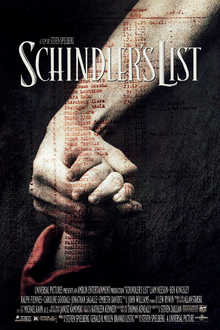
Schindler's List is a 1993 American epic historical drama film directed and produced by Steven Spielberg, and written by Steven Zaillian. It is based on the historical novel Schindler's Ark (1982) by Thomas Keneally. The film follows Oskar Schindler, a German industrialist who saved more than a thousand mostly Polish–Jewish refugees from the Holocaust by employing them in his factories during World War II. It stars Liam Neeson as Schindler, Ralph Fiennes as SS officer Amon Göth, and Ben Kingsley as Schindler's Jewish accountant Itzhak Stern.
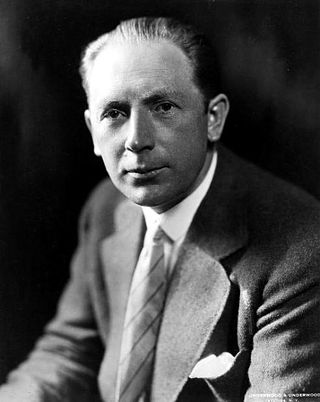
Friedrich Wilhelm Murnau was a German film director, producer and screenwriter. He is regarded as one of cinema's most influential filmmakers for his work in the silent era.

Nosferatu: A Symphony of Horror is a 1922 silent German Expressionist vampire film directed by F. W. Murnau from a screenplay by Henrik Galeen. It stars Max Schreck as Count Orlok, a vampire who preys on the wife of his estate agent and brings the plague to their town.
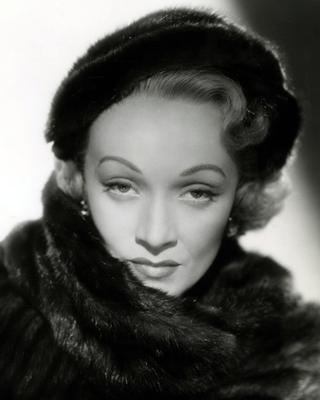
Marie Magdalene "Marlene" Dietrich was a German-born American actress and singer whose career spanned nearly seven decades.

Hans Florian Zimmer is a German film score composer and music producer. He has won two Academy Awards, a BAFTA Award, five Grammy Awards, and has been nominated for three Emmy Awards and a Tony Award. Zimmer was also named on the list of Top 100 Living Geniuses, published by The Daily Telegraph in 2007.
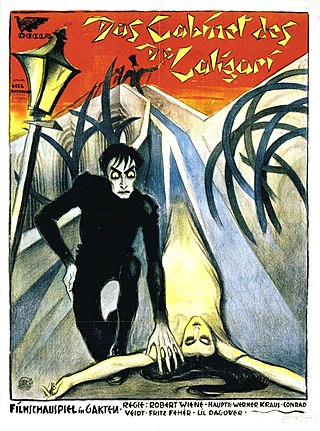
The Cabinet of Dr. Caligari is a 1920 German silent horror film directed by Robert Wiene and written by Hans Janowitz and Carl Mayer. The quintessential work of early German Expressionist cinema, it tells the story of an insane hypnotist who uses a brainwashed somnambulist to commit murders. The film features a dark, twisted visual style, with sharp-pointed forms; oblique, curving lines; structures and landscapes that lean and twist in unusual angles; and shadows and streaks of light painted directly onto the sets.

Klaus Kinski was a German actor. Equally renowned for his intense performance style and notorious for his volatile personality, he appeared in over 130 film roles in a career that spanned 40 years, from 1948 to 1988. He is best known for starring in five films directed by Werner Herzog from 1972 to 1987, who would later chronicle their tumultuous relationship in the documentary My Best Fiend.

Inglourious Basterds is a 2009 war film written and directed by Quentin Tarantino, starring Brad Pitt, Christoph Waltz, Michael Fassbender, Eli Roth, Diane Kruger, Daniel Brühl, Til Schweiger and Mélanie Laurent. The film tells an alternate history story of two converging plots to assassinate Nazi Germany's leadership at a Paris cinema—one through a British operation largely carried out by a team of Jewish American soldiers led by First Lieutenant Aldo Raine (Pitt), and another by French Jewish cinema proprietor Shosanna Dreyfus (Laurent) who seeks to avenge her murdered family. Both are faced against Hans Landa (Waltz), an SS colonel with a fearsome reputation for hunting Jews.

Diane Kruger is a German actress. Early in her career, she gained worldwide recognition and received the Trophée Chopard from the Cannes Film Festival.
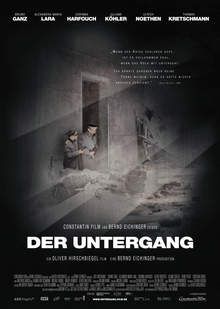
Downfall is a 2004 historical war drama film written and produced by Bernd Eichinger and directed by Oliver Hirschbiegel. It is set during the Battle of Berlin in World War II, when Nazi Germany is on the verge of total defeat, and depicts the final days of Adolf Hitler. The cast includes Alexandra Maria Lara, Corinna Harfouch, Ulrich Matthes, Juliane Köhler, Heino Ferch, Christian Berkel, Alexander Held, Matthias Habich, and Thomas Kretschmann. The film is a German-Austrian-Italian co-production.

German expressionist cinema was a part of several related creative movements in Germany in the early 20th century that reached a peak in Berlin during the 1920s. These developments were part of a larger Expressionist movement in Northwestern European culture in fields such as architecture, dance, painting, sculpture and cinema.

The Pianist is a 2002 biographical film produced and directed by Roman Polanski, with a script by Ronald Harwood, and starring Adrien Brody. It is based on the autobiographical book The Pianist (1946), a memoir by the Polish-Jewish pianist, composer and Holocaust survivor Władysław Szpilman. The film was a co-production by France, the United Kingdom, Germany and Poland.

Nosferatu the Vampyre is a 1979 gothic horror film directed and written by Werner Herzog. The film serves as both a remake of the 1922 film Nosferatu and an adaptation of Bram Stoker's 1897 novel Dracula. Herzog’s film is set in 19th-century Wismar, Germany, and Transylvania. The picture stars Klaus Kinski as Count Dracula, Isabelle Adjani as Lucy Harker, Bruno Ganz as Jonathan Harker, and French artist-writer Roland Topor as Renfield. There are two different versions of the film, one in which the actors speak English, and one in which they speak German.

Michael Fassbender is a German-Irish actor. He is the recipient of various accolades, including nominations for two Academy Awards, four BAFTA Awards and three Golden Globe Awards. In 2020, he was listed at number nine on The Irish Times list of Ireland's greatest film actors.

Christoph Waltz is an Austrian and German actor. Primarily active in the United States, he gained international recognition for his portrayal of villainous and supporting roles in English-language films. His accolades include two Academy Awards, two Golden Globe Awards, two BAFTA Awards, and two Screen Actors Guild Awards.
This is a list of the most notable films produced in German cinema.

The Berlin International Film Festival, usually called the Berlinale, is an annual film festival held in Berlin, Germany. Founded in 1951 and originally run in June, the festival has been held every February since 1978 and is one of Europe's "Big Three" film festivals alongside the Venice Film Festival held in Italy and the Cannes Film Festival held in France. Furthermore, it is one of the "Big Five", the most prestigious film festivals in the world. The festival regularly draws tens of thousands of visitors each year.